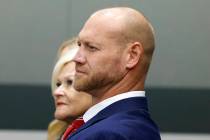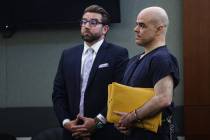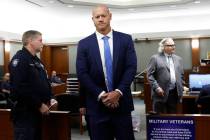Las Vegas Sands’ candor is questioned
After three days of sometimes tedious testimony reconstructing who knew what and when, the Las Vegas Sands Corp. sanctions hearing closed on an emotional note.
In framing the issue on Wednesday, Clark County District Judge Elizabeth Gonzalez said that Las Vegas Sands' conduct amounted to "very serious violations of duties of candor to the court by counsels representing a party. That's why I'm here."
She said she would issue a written ruling next week. Unlike a criminal case, there is no legally specified set of penalties she could order.
The matter arose out of a June disclosure in court that Sands and affiliate Sands China Ltd. possessed at its Las Vegas headquarters a computer hard drive containing about 100,000 emails sought by former Sands China CEO Steven Jacobs as evidence in his wrongful termination lawsuit against his one-time employer. Yet for the prior year, Sands attorneys argued that they could not turn over the material because it was in Macau and covered by its Personal Data Protection Act.
Todd Bice, representing Jacobs, called the episode "an assault on the court" that could not be excused as a mere lapse in judgment. The first hard drive came to Las Vegas in August 2010, followed by two other data transfers.
"What is the message you are telling the people who, in our system in Nevada, voted for you to safeguard the rule of law?" he said. That message would be, he added, "Don't you little people understand that when the billionaires of the world want to do things, they get to do them."
Lawyers and other litigants, he added, would conclude that the only way to win is to cheat.
On Wednesday, Justin Jones, one of the attorneys who has previously worked on the Sands side, had to admit during testimony that he had reviewed some of the emails in May 2011 in Las Vegas. But the next month, he said nothing in court while another Sands attorney told Gonzalez that no one could view the emails outside Macau.
In pushing for a "decisive" penalty, he said, "Mr. (Sands chairman and CEO Sheldon) Adelson could write a check for tens of millions of dollars and it isn't even going to be a blip on his radar screen."
But Samuel Lionel, the veteran attorney whose firm Lionel Sawyer & Collins was hired specifically for this hearing, said the attorneys involved have already been bruised.
"The publicity about this case has not been good," he said. "And if your honor were to find against my clients, (Sands) and the other parties, that would be devastating ... ."
Dozens of times, Lionel's partner Charles McCrea raised objections to questions posed by the Jacobs side because the answers would violate the attorney-client or attorney work product privileges.
Lionel said the objections were needed to protect Sands in other investigations spun off from the Jacobs case, including ones by the U.S. Securities and Exchange Commission, Nevada gaming regulators and in Macau and Hong Kong.
"What I have seen, and knowing the people involved, the lawyers did not make knowingly false statements," he said.
J. Stephen Peek, the lead attorney for Las Vegas Sands, had to take the witness stand for the first time in a 40-year career to answer question about what he might have concealed.
"My reputation and my career are more important to me than anything other than my children," Peek said. "I've worked hard to maintain that reputation in a very long career that now seems to have been placed in jeopardy by this court's proceeding."
He said he was faced with trying to balance protecting Sands under the Macau law while also trying to be up front with the court.
"If I made a mistake in that balance, I'm sorry," he said.
The various data transfers occurred, said Sands China attorney Brad Brian, when the company was marshaling evidence for an expected a lawsuit by Jacobs but before it understood the Macau law.
Contact reporter Tim O'Reiley at toreiley@reviewjournal.com or 702-387-5290.

















